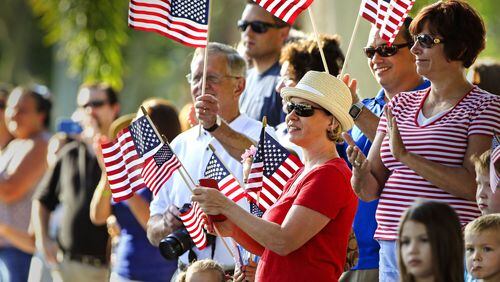Veterans are much more likely than non-vets to get hired by the federal government, but preferences for vets makes government payrolls less diverse, according to research by a Georgia State professor.
Mainly by having more men.
It is a trade-off: gratitude to vets against the value of having diversity, said Gregory Lewis, a professor of public policy at Georgia State.
“All policies come with costs,” Lewis said.
Lewis raised the somewhat controversial critique in an article he wrote online for The Conversation.
The government first started giving preferences to vets after the Civil War. The number of vets hired has soared in the past fifteen years, partly because of increased enlistments that accompanied the wars in Afghanistan and Iraq.
According to Lewis, 4.7 percent of Georgia’s full-time workers are on federal payrolls. Among veterans, 22 percent have federal jobs. Among non-vets, only 3 percent work for the feds.
The resulting workforce doesn’t look exactly like it would look without the vets.
"While it's good that the nation thanks its troops, the strong preference for veterans has had some negative effects as well, particularly in terms of lessening the civil service's diversity," Lewis wrote.
More than anything else, the preferences for veterans make the federal workforce much more male than it would be otherwise.
More than 80 percent of veterans are white and black men. That compares with 43.1 percent of non-veterans.
There is also one way in which the vets may increase the diversity of the federal workforce, Lewis said: Class.
“Veterans’ preference might increase economic diversity in the federal service because vets are more likely to come from lower class backgrounds,” he wrote.
______________________________
Georgia veterans and federal jobs
Decade of birth
% of vets with federal jobs
1940 11
1950 17
1960 21
1970 23
1980 38
1990 71
__________________________
Overall federal employment
Pct. by ethnicity and gender
Non-vets Vets | Total
--------------+----------------------+----------
White male | 33.31 55.42 | 40.57
White female | 32.03 9.46 | 24.62
Black male | 5.10 15.05 | 8.37
Black female | 11.24 5.45 | 9.34
Latino male | 5.18 9.24 | 6.51
Latina female | 5.20 1.95 | 4.13
Asian male | 4.10 2.79 | 3.67
Asian female | 3.84 0.63 | 2.78
Sources: Census Bureau, American Community Survey, Gregory Lewis
MYAJC.COM: REAL JOURNALISM. REAL LOCAL IMPACT.
AJC Business reporter Michael E. Kanell keeps you updated on the latest news about jobs, housing and consumer issues in metro Atlanta and beyond. You'll find more on myAJC.com, including these stories:
Never miss a minute of what's happening in local business news. Subscribe to myAJC.com.







